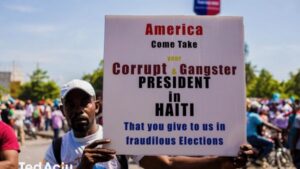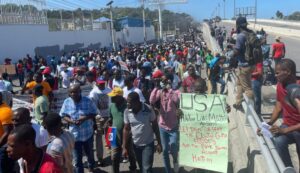Recently, Maryland swore in its first Black governor, Wes Moore, in a “historic” ceremony cemented with a tearful introduction by Oprah Winfrey and a hand on Frederick Douglass’ Bible. The Black elite flocked to fill the rooms of the inauguration to witness the third elected Black governor in U.S. history. Yet, this “first Black” gubernatorial win is history repeating itself.
African/Black communities have witnessed “first Blacks” consistently continuing over-policing, surveillance, criminalization and austerity policies.
As Black Alliance for Peace (BAP) member organization Ujima People’s Progress Party understands,
The Black middle-class’ allegiance to capitalism, and not Black liberation, has largely led the Black political leadership class to function as a comprador misleadership class over the Black majority of working peoples on behalf of the capitalist parties, and political machines they are members of.
For nearly a century, radical African/Black people have criticized elements of the African/Black community as being designed to serve as buffers to ruling class elements. Whether discerned as “neocolonial,” “the comprador class,” or “the Black Misleadership Class,” this sector has evaded accountability to the masses of African/Black people, while using their Black identity as cover for self-serving opportunism.
Moore first became famous for his 2010 bestselling memoir, The Other Wes Moore, an inspirational story of two boys with the same name and ties to Baltimore City. In interviews, Moore is depicted as a Black boy from an economically struggling background who became formally educated, rising to become a U.S. military veteran, and thus a socioeconomically developed Black man. The framing of his “life story,” as told through the book, not only helps manufacture an Obama-like image, politically. But in juxtaposition to the “other Wes Moore,” it leaves room to question how this narrative will affect his policies.
It remains unclear if Moore had been raised in Baltimore City. Yet, as the backdrop of Moore’s life story, the city has been central to his platform on crime. The Public Safety and Criminal Justice page on wesmoore.com states, “Violent crime is on the rise across Maryland and people are dying in our streets.” The solutions presented, however, will be nothing short of a plan to continue what former Governor Larry Hogan started in his campaign to “refund the police,” which increased resources for state law enforcement agencies following the 2020 uprisings.
Citing an “ineffectiveness of leadership,” Moore ignores that not only is Baltimore City already occupied with an array of federally funded police directives, it has just received an additional $7.9 million in federal funds to “fight crime.” This funding is a part of the Biden administration’s $350 million American Rescue plan to “fund the police,” as he enthusiastically announced in his 2022 State of the Union address. Unsurprisingly, in 2022, 1,192 people were killed by police, exceeding any other year in U.S. history. Also, Moore has ignored the existing consent decree issued in 2017, acknowledging the Baltimore Police Department (BPD) engaged in a pattern and practice of conduct that violated the First, Fourth, and Fourteenth amendments to the United States Constitution, and specific provisions of federal statutory law.
“The BPD has access to the Department of Defense (DOD) 1033 program budget. They also train with the Israeli Defense Forces (IDF) through the ‘deadly exchange program’ and continue to receive federal agents through Trump’s 2020 Operation Relentless Pursuit policy,” says Petros Bein, member of the Baltimore City Wide Alliance of the Black Alliance For Peace (BAP-Baltimore). “This is in addition to the approved privatized policing for universities, like Johns Hopkins, engulfing Black communities.”
These continued failed approaches to “crime” have only proven that added resources, as well as changes in policy or the law, will not contribute to public safety. Moore cannot “rebuild and strengthen relationships between communities and law enforcement agencies” by “increasing accountability and transparency” in a city in which the police department constantly violates its consent decree. Nor should funding community-policing initiatives that “recruit diverse officers that reflect the diversity of communities they serve” be taken seriously. The recent death of Tyre Nichols in Memphis, Tennessee (a city also operating under Operation Relentless Pursuit) has been the most illuminating example of the fallacy of Black faces occupying these spaces to the benefit of the African/Black community.
Policies that address crime in an over-policed city cannot be presented in the abstract. As the country celebrates a “first Black” governor, Maryland continues to imprison more African/Black people, per capita, than any other state. Moore needs to provide more specifics to explain what will be done and how this builds or departs from existing efforts to return control of the Baltimore City Police Department from the federal government to Baltimore City.
“Wes Moore’s connections with Mayor [Brandon] Scott’s office and the city design/city planning committee will shape or harm what’s happening in Baltimore. With no control over the city’s policing, Moore’s decisions directly affect the most marginalized of us,” acknowledges BAP-Baltimore core member, Kimya Nuru Dennis.
The Democratic Party has been able to depict Moore as a trusting solution for Maryland, in general, and for African/Black people, specifically. His socioeconomic status, as well as that of his donors, indicates to BAP-Baltimore what will undoubtedly shape whose voices matter most in prioritizing health, education, and safety-based policies and laws.
The lack of equitable housing that causes displacement, as well as food deserts, and low wages, have been pressing issues in Maryland. African/Black elected officials have not resolved the economic and social crisis facing the African/Black working class of Baltimore City. Instead, their lack of solutions have resulted in the overt criminalization and over-policing of African/Black communities. Police are constantly and consistently well-funded and well-resourced. BAP-Baltimore understands police are used to enforce the status quo of white power and colonial control over the lives of African/Black and other oppressed nations of people. This comes as the city has increasingly privatized and priced out our people. More police funding, while ignoring the causes of crime, cannot resolve the ongoing dilemma facing the African/Black working class in Baltimore City.
The post New Maryland Governor Wes Moore: Another “First Black” in a Colonial System first appeared on Dissident Voice.This post was originally published on Dissident Voice.


